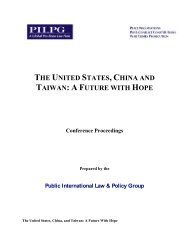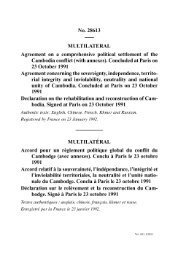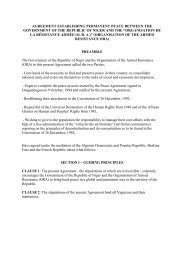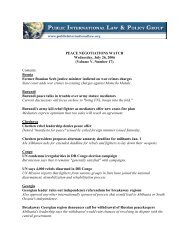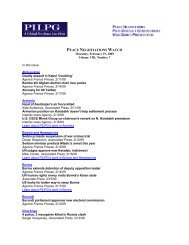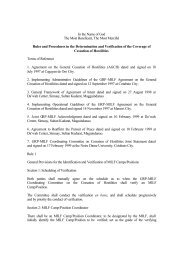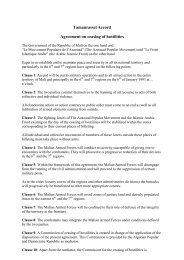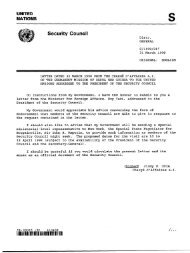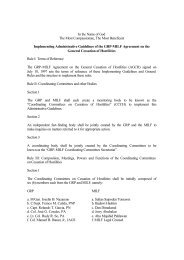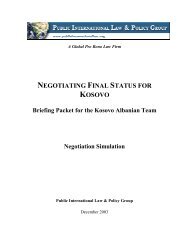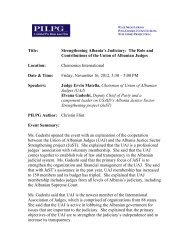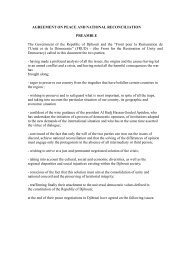You also want an ePaper? Increase the reach of your titles
YUMPU automatically turns print PDFs into web optimized ePapers that Google loves.
1<br />
<strong>KOSOVO</strong>:<br />
<strong>THE</strong> <strong>ROAD</strong> <strong>AHEAD</strong><br />
A Field Report<br />
Public International Law & Policy Group<br />
March 2002
2<br />
A Report Prepared by Louis Sell for the<br />
Public International Law & Policy Group<br />
March 2002<br />
<strong>KOSOVO</strong>: <strong>THE</strong> <strong>ROAD</strong> <strong>AHEAD</strong><br />
SUMMARY<br />
Government crisis: The crisis over the formation of Kosovo's first democratically elected<br />
government was resolved relatively quickly after the arrival of the energetic and<br />
determined new UN chief, Michael Steiner. The crisis has left a legacy of distrust among<br />
Albanian leaders and parties and between the international mission and the Kosovo<br />
Albanians which could hinder the next urgent task, establishing self-governing<br />
institutions led and staffed by the peoples of Kosovo. Differences loom on the horizon<br />
between the international community and the Kosovo Albanian leadership on issues such<br />
as the future status of Kosovo, privatization, and crime. Careful handling on both sides<br />
can keep these differences within acceptable bounds but missteps could lead to violence.<br />
Future status: All Kosovo Albanians continue to desire eventual independence; some<br />
believe they should push the international community now to lay out a roadmap for<br />
resolving Kosovo's future status; others believe that even a roadmap should be deferred in<br />
favor of building democratic institutions—and realities of separation from Belgrade—on<br />
the ground. Newly chosen Kosovo President Ibrahim Rugova said he intends to push on<br />
independence, which could cause problems with the international community. All<br />
Kosovo Serbs continue to reject independence; Serbs in the enclaves are working with<br />
the international mission and seem to hope that Kosovo will eventually return to some<br />
kind of loose association with Belgrade. Serb leaders in the north of Kosovo are seeking<br />
partition—which most Kosovo Albanians believe is Belgrade's goal as well. Sensing<br />
international momentum in favor of partition, Kosovo Albanians react with warnings of<br />
conflict in Presevo, Macedonia, and Bosnia. Some mean it. Absence of clarity about<br />
Kosovo's future continues to affect almost every aspect of life in Kosovo, including<br />
security, the economy, and refugee return.<br />
The international mission: Initial moves of new UN chief Steiner showed a sense of vigor<br />
and a human touch that was warmly welcomed by most Kosovars but he can expect to be<br />
tested by all sides in the coming months. The size of the international mission is<br />
beginning to decline in Kosovo—as it should as Kosovars assume more responsibility for<br />
their own fate. Nevertheless, a continued robust international security force and a<br />
civilian presence moving from an executive toward a monitoring role will be necessary<br />
for some time to come in Kosovo. The international mission should focus on a few key<br />
areas where (hopefully) it can still make a contribution in light of declining international<br />
interest and contributions—these include the establishment and expansion of democratic<br />
institutions, privatization and economic reform, and the battle against organized crime.
3<br />
Kosovo Serbs: Serbs hold 22 seats in the 120 seat Kosovo Assembly and are slated to<br />
receive one ministerial post under the deal forming a new Kosovo government brokered<br />
by Steiner. Despite some improvements in security, conditions for Serbs in the enclaves<br />
in the Albanian-dominated southern part of Kosovo remain difficult with few signs of<br />
change in the pattern of forced separation that emerged after the end of the 1999 war. In<br />
the north, Serbs live essentially apart from Kosovo and their leaders seem to be aiming at<br />
partition. Kosovo Serbs continue to reject any option for Kosovo's future other than<br />
association with Belgrade but significant sales of Serb property in Kosovo reveal a<br />
community in probably irreversible decline.<br />
Crime: Almost all Kosovars believe that one of the biggest areas of international failure<br />
has been in crime, including organized crime. The UN police force in Kosovo has a<br />
mixed record. The local, internationally trained police, the Kosovo Police Service (KPS)<br />
is beginning to be a presence although problems persist in training, equipment, and what<br />
some KPS regard as excessive restrictions on their activities by the internationals. The<br />
international mission says it intends to go more robustly against organized crime—widely<br />
believed to be a major problem in Kosovo—but it will need to hit all sources of organized<br />
crime and not just those linked to the ex-KLA, which is what some fear may happen.<br />
The KPC: The international community is pressing the commander of the Kosovo<br />
Protection Corps (KPC), the quasi-military civil defense service set up after the 1999 war<br />
to provide a home for KLA veterans, to demobilize 2,000 "reservists" and to cut back on<br />
what are widely believed to be improper, sometimes criminal activities by KPC members.<br />
The KPC commander, General Agim Ceku, complains about an anti-KPC attitude among<br />
many internationals and says he needs more resources if the KPC is to do its job and to<br />
rid itself of "bad apples." In general, the international community seems to have little<br />
idea what to do with the KPC and is ignoring the issue of what should be the role of the<br />
people of Kosovo in their own future security.
4<br />
RECOMMENDATIONS<br />
1) The UN should move quickly to establish all of the institutions of self-government<br />
authorized by the Kosovo Constitutional Framework. Once the new Kosovo government<br />
is up and running, UNMIK chief Steiner should publicly announce that as the Kosovars<br />
show themselves capable of governing under these existing arrangements he will modify<br />
the Constitutional Framework to expand the areas of self-governance allowed to the<br />
people of Kosovo, consistent with the provisions of UNSC 1244.<br />
2) Before the end of 2002, as the institutions of self-government take hold, Steiner should<br />
begin a process of consultations among the people and political parties of Kosovo<br />
intended to establish a road map for resolving the issue of Kosovo's final status.<br />
3) The UN and other civilian agencies in Kosovo should begin the process of handing<br />
over administrative responsibility for all aspects of Kosovo's internal affairs to the local<br />
and province-wide institutions called for in existing documents and chosen in the<br />
elections of 2000 and 2001.<br />
4) The UN should promptly privatize all medium- and large-scale formerly socially<br />
owned enterprises in Kosovo.<br />
5) The UN should announce a date certain, perhaps the middle of 2003, at which time all<br />
policing responsibility in Kosovo will be handed over to the KPS, with a reduced number<br />
of UN police remaining in a monitoring and advisory role. The international community<br />
should provide sufficient training and equipment to allow the KPS to police Kosovo in a<br />
modern and democratic fashion.<br />
6) Taking advantage of the presence of Serb deputies in the Kosovo Assembly, the UN<br />
should work with the new Kosovo government to establish the legal and institutional<br />
framework to allow Serbs full local autonomy within Kosovo, including, as necessary,<br />
the establishment of new municipalities.<br />
7) The international community should provide the KPC with sufficient resources and<br />
equipment to carry out its task of civil defense. The international mission should insist<br />
that by the end of 2002 all KPC reservists be demobilized and should provide priority<br />
treatment to these demobilized KPC personnel in finding jobs, including appropriate jobs<br />
with elements of the international mission in Kosovo.<br />
8) To foster genuine reconciliation between Kosovo Albanians and Serbs, UNMIK<br />
should help establish a mechanism which might be similar to the South African truth and<br />
reconciliation commission and which could—under international guidance—begin an<br />
honest and searching evaluation of past abuses by both communities.
5<br />
ASSESSMENT<br />
Government Crisis<br />
The three-month stalemate over forming Kosovo's first democratically elected<br />
government—after internationally run elections in November 2001—finally ended on<br />
February 27 in a compromise brokered by newly arrived UN chief Michael Steiner.<br />
Ibrahim Rugova, whose LDK party won almost 46 percent of the vote, will become<br />
President while the Prime Minister responsibility will go to Bajram Rexhipi, of the<br />
second largest PDK, not to the party's leader, former KLA chief Hashim Thaci.<br />
The long-running crisis was regarded by Kosovo Albanians and internationals alike as a<br />
disaster. It raised serious questions about the ability of Kosovo's current crop of<br />
politicians to govern the province effectively in a democratic fashion. The crisis also<br />
highlighted a number of dilemmas facing the international community, which now has to<br />
preside over the transfer of self-governing authority to the people of Kosovo without<br />
having any strategy for Kosovo's future.<br />
The November elections to the Kosovo Assembly, conducted by the OSCE as were the<br />
October 2000 local elections, were generally considered to have been well-run and an<br />
accurate reflection of the electoral will of the people of Kosovo. Serbs participated in the<br />
voting, for the first time since the 1999 war, but Albanian participation, approximately 67<br />
percent according to OSCE data, was down somewhat from the municipal elections in<br />
October 2000. Rugova's LDK with 46 seats, the PDK with 26, and former KLA chieftain<br />
Ramush Haradinaj's AAK with 8 seats shared almost all of the Albanian vote. The Serb<br />
Povratak coalition won 22 seats and ten are held by parties representing Kosovo's other<br />
ethnic minorities.<br />
After the elections the newly chosen assembly met three times, but with almost all of the<br />
non-LDK deputies refusing to participate, Rugova failed to achieve the necessary 60<br />
votes in the 120 member body to attain his cherished goal of becoming Kosovo's first<br />
democratically elected and internationally acknowledged president. The crisis had<br />
almost nothing to do with policy. It stemmed, rather, from a deep-seated animosity<br />
between Rugova and Thaci as well as reluctance within the LDK leadership to give up<br />
the power and patronage associated with the post of Prime Minister.<br />
On the surface, at least, there is little discernable policy difference between the two men<br />
or the two parties—both want Kosovo to be independent, as do all Kosovo Albanians,<br />
and both say that their immediate priority is to form Kosovo's new institutions of<br />
democratic self-government and to begin a process of privatization intended to get<br />
Kosovo's former socially-owned economy moving again. Rugova and Thaci, however,<br />
have deep-rooted personal and political differences which go back to the 1999<br />
Rambouillet conference, where Thaci was the beneficiary of a coup which deposed<br />
Rugova from his previously accustomed leadership position on the Albanian team, and to<br />
the era immediately after the 1999 conflict, when the Thaci led a KLA-dominated<br />
"Provisional Government" which used the prestige—and arms—won in the conflict with
6<br />
the Serbs to take control of Kosovo's political and economic and social institutions, often<br />
riding roughshod over Rugova's LDK in the process. Also driving the crisis was concern<br />
within the LDK hierarchy that if he won the Presidency by sacrificing an LDK Prime<br />
Minister, Rugova—an aloof figure notorious for ignoring the advice and the interests of<br />
his LDK subordinates—might cast the LDK adrift.<br />
In meetings with me both Rugova and Thaci denied that personalities played any role in<br />
the crisis but their words and demeanor showed the opposite. Rugova refused even to<br />
mention Thaci by name, referring instead to "that guy" and saying that if Thaci were<br />
allowed to become Prime Minister there would be a repetition of the problems in 1999<br />
under the "so-called" Provisional Government." Thaci, for his part, told me he did not<br />
hate Rugova but that he did not owe him anything either. Thaci also said he did not<br />
believe Rugova could be trusted to represent Kosovo's interests with sufficient vigor in<br />
discussions over Kosovo's future.<br />
Maneuvering over the government crisis exposed some of the seamy side of Kosovo<br />
politics. Although the November 2001 campaign was relatively violence-free, shortly<br />
after the election a prominent LDK figure was shot and killed. Although UN police<br />
announced that the shooting was not political, many Kosovo Albanians believe that it did,<br />
in fact, stem from political motives intended to intimidate LDK supporters.<br />
Representatives of the ten, non-Serb minority representatives are widely reported to have<br />
been intimidated against voting for Rugova, which would have brought him to the verge<br />
of victory. Rugova told me that he had not pressed the non-Serb minorities to vote for<br />
him because he knew that would be dangerous for them. Former Kosovo Communist<br />
chief Azem Vllasi, whose wife is a Bosnian Moslem and who has close ties to the non-<br />
Serb Kosovo minorities, told me he was aware of threats aimed at minority deputies and<br />
that he believed these stemmed from PDK sources.<br />
Why the crisis led Ramush Haradinaj to throw in his lot with Thaci and the PDK is<br />
unclear. Rugova told me that he had unsuccessfully sought Haradinaj's support for the<br />
presidential vote but that he believed Haradinaj and Thaci were essentially operating as<br />
one party group. Haradinaj, for his part, told me that he had not supported Rugova<br />
because he believed Kosovo should have a united leadership that included the leaders of<br />
all three major parties.<br />
Neither Rugova nor Thaci sought the support of the Kosovo Serb "Povratak" coalition,<br />
whose 22 deputies could have given the president's post to Rugova. The U.S. office<br />
apparently attempted to persuade the Serbs to vote for Rugova but this effort failed,<br />
although the "Povratak" leader, Rada Trajkovic, was evidently tempted. The number two<br />
in "Povratak," Oliver Ivanovic, described the U.S. offer as vague, called Trajkovic a U.S.<br />
puppet for considering it, and said that Serbs would have voted for either Albanian<br />
faction provided they would have offered a written guarantee that all Serbs would have<br />
security, freedom of movement, and the right to return to their homes—a proposal<br />
obviously designed to be rejected. Trajkovic, for her part, told me that after the
7<br />
resolution of the crisis Kosovo Serbs would look to the international mission to secure for<br />
them one ministerial post, preferably that of electric power or communications.<br />
The international community, which helped cause the problem by rejecting the Kosovo<br />
Albanian desire to have the post of Kosovo President chosen by direct election, initially<br />
failed to engage effectively to resolve the Kosovo government crisis. Many Kosovo<br />
Albanian leaders complained that diplomatic representatives have sent conflicting signals<br />
about their preferred strategy for resolving the government crisis. Former UNMIK chief<br />
Haekkerup seems to have played no effective role in trying to broker a compromise<br />
before his abrupt departure in January 2002. The U.S. mission in Kosovo, the most<br />
respected international authority in the province, made no secret of its preference for<br />
Rugova and its view that the PDK should be satisfied with the LDK's initial offer of five<br />
ministerial posts under an LDK Prime Minister. The U.S. office met with all of the<br />
Kosovo political leaders and organized meetings of Assembly delegates but did not,<br />
apparently, push a specific solution other than seeking to get the Serbs to vote for<br />
Rugova.<br />
Although the crisis was resolved relatively quickly after the arrival of the energetic and<br />
determined Steiner, it did considerable damage both in and out of Kosovo. The inability<br />
of the Kosovo Albanian leaders to resolve their differences and get on with the manifestly<br />
more important business of beginning to build democratic institutions of self-government<br />
reinforced already strong views among many members of the international community<br />
that Albanians cannot be trusted with governing themselves. This, in turn, could well<br />
increase reluctance among many members of the international mission to begin turning<br />
over the reins of governance to locals and in the longer run further tilt the balance of<br />
opinion against the Kosovo Albanians' preferred option of independence.<br />
Many informed observers of the Kosovo political scene also believe that the government<br />
crisis encouraged disenchantment among the Kosovo Albanian people with all of the<br />
current crop of Albanian leaders. As Blerim Shala, the respected editor of the<br />
independent Pristina daily Zeri told me, the people are fed up with the crisis and "the<br />
three top political leaders are all sinking together." More than 30 percent of the<br />
electorate did not participate in the 2001 elections, a relatively high figure for the<br />
politicized Kosovo environment. If resolution of the crisis is not followed promptly by<br />
the establishment of effective mechanisms of self-government, which begin to take hold<br />
and to accomplish tangible improvements in the daily lives of the people, alienation from<br />
the political process itself could grow, with unsettling implications for democracy in<br />
Kosovo.<br />
Kosovo Albanians, for their part, once they have finished the process of assigning jobs<br />
and setting up institutions, will almost certainly begin pushing for additional selfgoverning<br />
authority beyond that allowed by the relatively restrictive Constitutional<br />
Framework promulgated by Haekkerup in May 2001. A certain amount of bumping and<br />
elbowing between the international mission and the Kosovo leaders on this point is<br />
inevitable in the coming months. Whether it becomes worse will depend on the political
8<br />
skill of Steiner and the Kosovo leaders and on whether they can move jointly to attack the<br />
most pressing problems.<br />
It seems likely that one of the consequences of the crisis over forming a government<br />
could be a realignment of the Kosovo Albanian political scene. The crisis may also open<br />
up some political space for new political personalities to replace or supplement the three<br />
leaders of Rugova, Thaci, and Haradinaj who have dominated the Kosovo Albanian<br />
political stage since the 1999 war. Changes in the current Kosovo Albanian party<br />
structure could be desirable since all of the three major parties define themselves mainly<br />
over their leaders and the way they address the past.<br />
Dr. Bujar Bukoshi, the Prime Minister of the LDK-led Kosovo Albanian parallel state in<br />
the 1990s, confirmed to me his intention to launch a new political party in the near future.<br />
Bukoshi, who did not bother to conceal his disdain for Rugova, thought his party would<br />
attract the support of a considerable number of LDK voters—and of some LDK delegates<br />
in the Assembly—as well as of non-voters in the 2001 election.<br />
The government crisis also caused a resurgence of rumors about a split within the PDK<br />
between backers of Thaci and party leaders with ties to other regions and factions within<br />
the ex-KLA. If the relatively moderate Rexhipi gains in stature through his performance<br />
as Prime Minister, such strains could increase. Dissatisfaction with Rugova continues to<br />
fuel speculation of a split within the LDK but those who might like to get out from under<br />
Rugova's leadership are handicapped by the absence of any alternatives within the LDK<br />
with the stature to stand separately from Rugova.<br />
A reshuffling of the Kosovo Albanian political party alignment structure might lead<br />
eventually to the emergence of new and in some cases younger political figures. Adem<br />
Demaci—still respected because of his 30 years imprisonment and often capable of<br />
surprising moderation—told me he intends to return to the political scene once the<br />
current crop of leaders have come to their—in Demaci's eyes, inevitable—end. Albin<br />
Kurti, a prominent student leader in the 1990s who wears a martyr's halo because of his<br />
three years imprisonment by the Serbs, is highly intelligent and hosts a weekly public<br />
affairs TV show, which keeps him in the public eye and gives him an excellent finger on<br />
the political pulse of Kosovo. And there are always the prominent Albanian political<br />
intellectuals, such as Veton Surroi, Blerim Shala, and Shkelzen Maliqi, who might<br />
someday return to the political scene where they were prominent in the 1990s.<br />
In a meeting with me before the crisis was resolved, Rugova told me that his first priority<br />
as president would be independence and his second would be revitalization of the<br />
economy through foreign investment and privatization. (On Rugova and independence<br />
see the "Future Status" section below.) Rugova said he intended to be an active and<br />
visible president, communicating often with the Kosovo people and seeking thereby to<br />
lead them peacefully toward independence and democracy. Somewhat enigmatically, he<br />
said he would use a clause in the Constitutional Framework which makes the president<br />
the guarantor of the democratic functioning of the system to expand the role of the
9<br />
president beyond the limited and largely ceremonial functions provided in the<br />
Constitutional Framework.<br />
A doctor and a member of the LDK in the 1990s, Rexhipi treated KLA wounded in the<br />
mountains during the 1999 war and after the conflict emerged as the first mayor of the<br />
divided city of Mitrovica. Although Rexhipi joined the PDK, he had the respect of all<br />
Albanian factions in the city and, under the auspices of former U.S. Mitrovica<br />
Administrator William Nash held several meetings with the then Serb leader of the north,<br />
Oliver Ivanovic.<br />
In a meeting with me before he was appointed Prime Minister, Rexhipi generally hewed<br />
to the PDK line but also demonstrated a willingness to discuss all sides of an issue in a<br />
generally straight-forward fashion. He blamed Rugova for the government crisis but also<br />
predicted that Thaci would be willing to withdraw as a Prime Minister candidate if<br />
necessary. He thought that the PDK would be able to work with a part of the LDK and<br />
with Bukoshi's new party. Rexhipi also acknowledged honestly that the PDK itself was<br />
far from united, with what he described as 20 to 30 percent of the party skeptical of<br />
Thaci's leadership.<br />
Rexhipi was bitter about the international mission's role in Mitrovica—claiming (with<br />
good reason) that it had done nothing to resolve the city's divided status. He said that<br />
Kosovo Albanians would never accept the partition of Kosovo, which he believed was<br />
the clear aim of most of the Mitrovica Serb leadership, and he also opposed Ivanovic's<br />
idea of a separate (Serb-controlled) municipality in northern Mitrovica.<br />
Future Status<br />
Neither the fall of Milosevic in Belgrade nor the prolonged government crisis in Kosovo<br />
caused any change in the virtually unanimous support among Kosovo Albanians for full<br />
independence as their future goal. Few Kosovo Albanians I spoke to—whether political<br />
leaders or man in the street—thought Kosovo should seek independence immediately—in<br />
part because they fear this could lead to an international departure from Kosovo.<br />
There were two broad views among Kosovo Albanians about getting to independence.<br />
One view—espoused by Rugova and Haradinaj among others—was that it would be<br />
important to begin to map out a process for achieving independence relatively soon after<br />
the governmental crisis was resolved and as Kosovo begins to create self-governing<br />
institutions. A second view—held by Thaci and others—was that the current situation<br />
amounted to de facto independence and that in view of the current international mood it<br />
would be better to postpone discussion of final status until some indefinite point in the<br />
future.<br />
Rugova and others in the LDK mapped out for me a relatively hard-line position on<br />
independence and status. (All who have dealt with Rugova over the years understand<br />
that although he is a genuine man of peace and a moderate on tactics he is absolutely<br />
uncompromising on independence as the only acceptable final outcome for Kosovo.)
10<br />
Rugova told me that once he became President—he had no doubt that would be the final<br />
outcome—independence would be his first priority, but that he would proceed in a step<br />
by step fashion. He said he was against any new kind of "arrangement" with Belgrade.<br />
Asked if he would talk to Belgrade, Rugova said yes but only after Kosovo had been<br />
recognized as independent and then only to work on "normalizing" arrangements with<br />
Belgrade. Rugova acknowledged international reserve on Kosovo independence and he<br />
said there was growing concern among Kosovo Albanians that the international<br />
community might seek to bring Belgrade back to Kosovo in some fashion. Nevertheless,<br />
he said he would work to change international attitudes. ("That is my job.")<br />
Thaci, by contrast, feared that raising the issue of final status now would lead to Kosovo's<br />
partition. Thaci, along with most other Kosovo Albanians, believed that partition is<br />
Belgrade's objective in Kosovo. He said he would not raise status until Kosovo was<br />
represented in Washington and he noted bitterly in this connection that Djindjic and other<br />
Serbian leaders travel frequently to Washington but Kosovo Albanian leaders no longer<br />
get such U.S. attention. Thaci did not bother to hide his unhappiness with what he sees as<br />
a shift by the Bush Administration away from priority attention to the Balkans and away<br />
from dealing with him as the primary factor in Kosovo.<br />
Few Kosovo Albanians seemed to have done much serious thinking about how to achieve<br />
independence. Kosovo Albanians are closely watching developments in Montenegro and<br />
obviously rooting for independence and for international recognition of Montenegro's<br />
right to hold a referendum on the issue. Informed observers also seemed excited by the<br />
Montenegro option being pushed by EU security chief Javier Solana, which they believed<br />
would amount to the end of the FRY and thereby, they believed, put paid to international<br />
arguments that UNSC 1244 requires that Kosovo maintain some kind of a link with<br />
Belgrade via the FRY.<br />
Blerim Shala, the respected editor of the Pristina daily Zeri, was the only one who<br />
seemed to have done any strategic thinking on the path to independence. He thought that<br />
Kosovo Albanians should take as a starting point in final status talks an arrangement<br />
similar to what Solana was pushing in Montenegro. An interim arrangement, with a<br />
referendum at the end would also be acceptable to the Kosovo Albanians since, in Shala's<br />
view, time was on the side of the Kosovo Albanians. Shala said Albanians should<br />
volunteer arrangements would include almost anything the Kosovo Serbs could<br />
conceivably want, including dual citizenship, open borders and free trade, local autonomy<br />
including new municipalities for Serb areas, Serb cultural rights such as their own<br />
curriculum, and extra-territorial rights and a "Vatican guard" for Serb shrines such as<br />
Gracanica. (Comment: Shala seemed to be putting forward these proposals—all of which<br />
I believe are quite reasonable—in order to alleviate international concern about Albanian<br />
mistreatment of the Serb minority, to head off proposals for partition, and also, probably,<br />
because he thought that even these reasonable proposals might be rejected by Serbs if<br />
they were part of an independence package for Kosovo. Shala's remark about time being<br />
on the side of the Albanians should be seen in the context of his view that Serbs were<br />
moving out of the southern Balkans. He said Serbs were continuing to leave Kosovo and
11<br />
that the Serbian population was dropping in Presevo and Sandjak as well. End<br />
Comment)<br />
In contrast to Albanians, Kosovo Serbs continue to be solidly opposed to any thought of<br />
independence. Rada Trajkovic, the leader of the Serb delegates in the Kosovo Assembly,<br />
said that virtually all Kosovo Serbs, herself included, would leave Kosovo now if they<br />
had anywhere to go. (She noted that one of her children is studying at Georgetown<br />
University in Washington and the two others are studying in Serbia.) Trajkovic wanted<br />
no part of an independent Kosovo, even one in which Kosovo Serbs would be guaranteed<br />
security, local autonomy and full human rights. She added that Serbs would never give<br />
up Kosovo and if Serbs were forced to leave they would return again with the Serbian<br />
army as soon as international forces left the region. The deputy leader of the Serb<br />
Assembly delegates, Oliver Ivanovic from Mitrovica, also firmly opposed independence<br />
for Kosovo. He said that before the issue of Kosovo's final status is addressed Kosovo<br />
Albanians should be required to renounce any goal of independence.<br />
The general attitude within the international mission to the issue of final status seems to<br />
be one of "make it go away—at least on my watch. " Almost all members of the<br />
international mission—whether UN, OSCE, or diplomats—take the view that it would be<br />
premature to discuss final status now. A few—including those who had been in Kosovo<br />
the longest and who had the most understanding for the situation on the ground as<br />
opposed to how it appears in capitals—underscored that absence of clarity on status<br />
causes problems in many areas across Kosovo. Almost no one in the international<br />
mission appears to be doing any serious thinking on the issue of how to resolve final<br />
status.<br />
Newly arrived UNMIK chief Michael Steiner said that discussions on final status should<br />
be deferred until later but he also apparently believes that one of the achievements he<br />
should aim for is to have in place by the time of his departure a path or mechanism for<br />
beginning to discuss the issue. U.S. Chief of Mission John Menzies also said it would be<br />
premature to raise final status now. He said he avoids taking any position on status in<br />
talks with Kosovars.<br />
Given the broad gap between the desires of Kosovo Albanians for independence and the<br />
ostrich-like attitudes of the Kosovo Serbs and the international community, a case can be<br />
made for postponing any discussion of status until later. Unfortunately, however, lack of<br />
clarity about the future continues to cause serious underlying problems within Kosovo, in<br />
Serbia, and more broadly within the region as a whole.<br />
There is growing fear among Kosovo Albanians that the international community might<br />
insist on returning them to some kind of association with Belgrade. This concern only<br />
hardens Kosovo Albanian attitudes in any area which they believe might be affected by<br />
the issue. Kosovo Albanians understand that Kosovo Serbs long for Belgrade's return<br />
just as much as they Albanians fear it. Until this issue is resolved, Kosovo Albanians will<br />
view Serbs in Kosovo as a potential "fifth column" making true security for Serbs<br />
virtually impossible.
12<br />
Genuine reconciliation between Albanians and Serbs will be impossible until there is<br />
some resolution of the issue of final status but this will also require an honest<br />
examination on both sides of the recent past. The international mission in Kosovo is<br />
making no effort to accomplish this. Noted Kosovo Albanian human rights activist Vjosa<br />
Dobruna pointed out that since the end of the 1999 war, the international community has<br />
condemned Kosovo Albanian abuses of the Kosovo Serb minority. Yet, the<br />
internationals have not devoted similar attention to the abuses of the Kosovo Albanian<br />
population by the Serbs under the Milosevic regime. She said this has led to growing<br />
resentment even among well-intentioned persons such as herself regarding the lack of<br />
perspective on human rights abuses, which perversely has the effect of reducing Kosovo<br />
Albanian efforts end these abuses against Serbs. She urged greater efforts toward<br />
genuine reconciliation between the two groups through a mechanism that might be<br />
similar to the South African truth and reconciliation commission, which could—under<br />
international guidance—begin an honest and searching evaluation of past abuses by both<br />
communities.<br />
Absence of clarity on Kosovo's future also has a devastating effect on efforts to revive<br />
Kosovo's economy, which virtually all Kosovo Albanians place at the top of the agenda<br />
of things that need to be done. With foreign assistance to Kosovo beginning to drop off,<br />
foreign investment must be the primary vehicle for reviving medium and large scale<br />
economic activity in Kosovo. It is completely unrealistic, however, to expect significant<br />
foreign investment in Kosovo if potential investors do not know what state their<br />
investment might belong to and if they understand that some of the potential options for<br />
the future could well rekindle war.<br />
International differences over Kosovo's future status have also blocked privatization,<br />
which is essential to getting the formerly socially owned sector of Kosovo's economy<br />
moving again. For two years privatization has been held up by the UN in New York,<br />
ostensibly out of concern that it could undermine potential claims of owners deriving<br />
from Milosevic's (phony) privatizations of the 1990s. The real reason, of course, is that<br />
several UN Security Council members fear that privatization now could undercut the case<br />
for Belgrade's continued sovereignty in Kosovo. Absence of clarity about ownership<br />
obviously impedes legitimate investment at the same time it encourages informal<br />
"privatizations" of existing assets by individuals or groups with money of questionable<br />
provenance.<br />
One problem with the notion of final status is that both Serbs and Albanians continue to<br />
view it in a binary fashion. When I discussed the issue in terms of practical arrangements<br />
to meet concerns on both sides, my interlocutors often reacted with surprise and interest.<br />
For example, when I discussed the notion of an independent Kosovo, embedded in<br />
regional ties, with open borders, full local autonomy for minorities, extra-territoriality<br />
and a small contingent of Serb guards for shrines such as Gracanica, Rada Trajkovic, who<br />
only minutes before had been fulminating about the return of Serb troops to Kosovo, said<br />
that might be a possible solution.
13<br />
The International Mission<br />
Michael Steiner, a German diplomat with extensive experience in the Balkans, took over<br />
as the head of the UN mission in Kosovo in February. Kosovo Albanians welcomed<br />
Steiner, whose initial active engagement to resolve the government crisis and public<br />
outreach through such actions as a visit to Pristina's oldest high school were seen as a<br />
refreshing contrast with the reclusive style of Steiner's predecessor Haekkerup. In his<br />
first speech to the people of Kosovo Steiner described his priorities as the economy,<br />
crime, and justice. Most Kosovars would agree with those priorities and all Kosovars I<br />
spoke to thought the speech was excellent.<br />
Steiner is well aware that his initial honeymoon with the people of Kosovo will inevitably<br />
come to an end and that there will be difficult times ahead. His speech was silent on the<br />
issue of Kosovo's future status and said little on how much power he intended to allow<br />
the people of Kosovo in establishing new, self-governing institutions, areas where<br />
disputes with the Kosovo Albanian leaders could quickly arise. Steiner will also be<br />
judged on how he delivers on these and other issues which affect the daily lives of<br />
Kosovo citizens, such as local services and utilities, where many Kosovars believe the<br />
international mission has conspicuously failed to deliver, despite the passage of almost<br />
three years effort and the expenditure of hundreds of millions of dollars.<br />
Steiner inherits an international mission in Kosovo which has some important successes<br />
to its credit but which—almost three years after the end of the war—continues to suffer<br />
from the absence of any strategy for Kosovo's future. Successes are sometimes achieved,<br />
yet in Kosovo's complex international environment, where even routine actions often<br />
require forging a consensus reaching up to the Security Council, forward movement is<br />
generally slow and spasmodic.<br />
The fact that there is any progress at all is a testimony to the dedication of some members<br />
of the international mission. Unfortunately, however, there is also an impression—<br />
impossible by its nature to quantify or fully verify—that three years after the war the<br />
character of the international mission is changing. Many of the top notch international<br />
civil servants found in the first wave of the Kosovo mission, attracted by the challenge of<br />
serving at the epicenter of one of the world's most active crisis areas and dedicated to<br />
making an impact, have moved on. Their replacements are sometimes persons turned up<br />
routinely by international bureaucracies, often with little interest in the area or its people.<br />
There is also, moreover, a growing sense of "familiarity breeds contempt" on both sides<br />
as well as the absence of historical memory among the internationals. Few members of<br />
the current international mission witnessed Serb ethnic cleansing at first hand. For most<br />
internationals, the current reality is the daily frustrations of dealing with the majority<br />
Albanian population, which often has very different views of what Kosovo's reality is or<br />
ought to be. This has given rise to attitudes of skepticism among many members of the<br />
international mission that sometimes border on contempt—attitudes which are often<br />
reciprocated by the local Albanian population. As one Western diplomat assured me,
14<br />
"These people (meaning the Kosovars) just don’t have any understanding for<br />
democracy."<br />
Kosovo Albanians regard NATO as their liberator from Serb oppression and recognize<br />
that continued international presence is still their best guarantor against the return of<br />
Serbia to Kosovo. Kosovo Albanians respect individual members of the international<br />
community, especially the more senior figures, but they tend to regard the run-of-the-mill<br />
international with what former political prisoner Albin Kurti called, "contempt tending<br />
toward hostility."<br />
For three years Kosovo Albanians have had the experience of close contact with the<br />
international mission either in the capacity of employees—thousands serve in positions<br />
such as driver, guard, interpreter and a much smaller number in executive positions—or<br />
in the capacity of the governed. It has not been an easy relationship and to many Kosovo<br />
Albanians it appears as if the international mission is incapable of governing Kosovo<br />
effectively yet on the other hand is reluctant to hand over authority for governing<br />
themselves to the people of Kosovo.<br />
It is also true that the attitudes of the Kosovo Albanians toward the international<br />
community include large does of favoritism among nations and racism toward<br />
individuals. Certain Western nations—chiefly the United States, Great Britain, and<br />
Germany—are welcomed and considered friends; others are consigned to the category of<br />
dubious supporters or potential adversaries. Kosovar attitudes toward Third World<br />
internationals are often tinged by racism. Kosovars (here is one area, at least, where<br />
Serbs and Albanians agree) believe themselves to be European and they resent being<br />
administered by individuals from the Third World. These attitudes have not made the<br />
relationship between Kosovars and the international mission any easier.<br />
Steiner will also confront the legacy of past international mistakes in key areas—which<br />
are likely to be difficult to correct, especially in an era of declining interest and resources<br />
accorded to Kosovo and the Balkans generally. From the perspective of almost three<br />
years international rule in Kosovo, it is apparent that several critical mistakes were made<br />
early on. These, in turn, have created a reality that the international community will have<br />
to deal with in the future. These include: (1) the failure to protect the Serb minority from<br />
Albanian revenge attacks after the 1999 war and the consequent separation of Albanian<br />
and Serb societies in Kosovo into virtually separate units; (2) the division of Mitrovica<br />
and the separation of the northern part of Kosovo into an exclusively Serbian inhabited<br />
and Belgrade controlled fiefdom; and (3) the failure to undertake economic privatization<br />
and reform, which had the effect of channeling much of the Kosovo Albanians' abundant<br />
entrepreneurial spirit into the grey economy with implications for the rise of organized<br />
crime and other forms of extra-legal activity.<br />
The Kosovo Serbs<br />
The situation with respect to the Kosovo Serbs—like almost everything else in Kosovo<br />
today—is mixed. During 2001 there was a noticeable reduction in the number and scale
15<br />
of violent incidents against Kosovo Serbs and some improvement in providing basic<br />
living services, in part through the operation of the local community offices established<br />
by the UN in Serb enclaves. Violence remains a problem, however, as seen by the<br />
murder of a Serb near Lipljan toward the end of February.<br />
The basic picture for Serbs in Kosovo remains as it has been since the end of the 1999<br />
war. In the Albanian-dominated southern part of Kosovo, Serbs live in isolated enclaves<br />
or in small groups, where they are dependant on the international mission for security,<br />
movement outside the enclaves, and provision of most basic human services. In the<br />
north, beyond the Ibar divide, Serbs are completely separated from the rest of Kosovo,<br />
living for most purposes in an extension of Serbia.<br />
Serbs throughout Kosovo continue to look to Belgrade for direction. Most Kosovo Serb<br />
political leaders reach back to Belgrade for support from one or another of the leading<br />
figures in the ruling DOS coalition. Sympathy for Milosevic's Socialist Party of Serbia<br />
(SPS) was also said to remain strong.<br />
Data on the number of Serbs remaining in Kosovo is scanty. Despite intensive<br />
international efforts to create conditions for the return of Serbs and a few well-publicized<br />
incidents of return, it is apparent that the Serbs of Kosovo are a declining community.<br />
Attitudes toward politics and the future differ widely between Serbs in the enclaves and<br />
Serbs in the north. In the enclaves Serbs recognize that their future depends on some<br />
form of cooperation with the international community. Serbs in the north feel themselves<br />
essentially to be part of Serbia and want little to do with the international community.<br />
Serbs in the south continue to dream that Kosovo will return to some form of association<br />
with Belgrade although they probably recognize that Albanians will play a dominant role<br />
in Kosovo whatever its future status is. Serbs in the north, by contrast, are increasingly<br />
openly laying the ground for partition. One thing unites Serbs throughout Kosovo—<br />
continued unwillingness to consider independence for Kosovo.<br />
Undoubtedly the most positive development involving Kosovo Serbs was the decision of<br />
the coalition "Povratak" to participate in the 2002 elections and to take their seats in the<br />
Kosovo Assembly. (The word "povratak" means "return" in Serbo-Croatian and its<br />
message is a dual one. Ostensibly it refers to the desired return to Kosovo of Serb<br />
refugees; subliminally, it is also understood to convey what Albanians would regard as<br />
the threat of Belgrade's return to rule.) After prolonged negotiations between Belgrade<br />
and UNMIK chief Haekkerup, FRY President Vojislav Kostunica shortly before the<br />
autumn parliamentary elections in Kolsovo gave a grudging blessing to the participation<br />
of Kosovo Serbs, both those in Kosovo and refugees living in the FRY.<br />
The results were that over 89,000 Serbs voted for Povratak, the only Serb party on the<br />
ballot. There were, however, clear divisions within the Kosovo Serb community on the<br />
issue. In the Serb-dominated northern portion of Kosovo there were many instances of<br />
intimidation of voters, with a result that participation there was lower than in Serb<br />
enclaves in the south.
16<br />
Kosovo Serbs gained 22 seats in the 120 seat Kosovo Assembly, including 10 specifically<br />
set aside for Serbs by the Constitutional Framework and an additional 12 allocated on the<br />
base of the proportion of Serb votes in the overall balloting. This gives the Serbs, who<br />
almost certainly amount to less than 10 percent of Kosovo's total population, almost<br />
double the share of votes over what they would have received based on a purely<br />
proportional vote. This disbalance is resented by the Kosovo Albanians and they will<br />
certainly insist on correctives to the election procedures before the next vote but for the<br />
moment they are prepared to live with it.<br />
The Povratak delegation in the Assembly is led by Rada Trajkovic, a physician living in<br />
the Serb enclave of Gracanica near Pristina, who before the 1999 war was Minister for<br />
Family and Child Care in the Serb government, representing Vojslav Seselj's hard-line<br />
nationalist Serbian Radical Party. Trajkovic has replaced Bishop Artemije as the favorite<br />
of the international community and especially of the United States. A senior Western<br />
official praised Trajkovic, who he said had definitely made the switch to seeking a<br />
political decision in Kosovo and who he was convinced would remain in Kosovo even if<br />
the province became independent.<br />
As with Artemije, who has vanished from the Kosovo political scene, there remain real<br />
questions about both Trajkovic's political orientation and the degree of support she enjoys<br />
among Kosovo Serbs. Trajkovic herself told me that her policies of accommodation with<br />
the international community enjoy little support among Kosovo Serbs. She thought that<br />
Milosevic's Socialist Party of Serbia would win a genuinely free election in her current<br />
home of Gracanica. Kosovo Albanians remember her description of Kosovo Albanian<br />
women as "child-bearing machines" and consider her, like other Kosovo Serb physicians<br />
to be complicit in the expulsion of Albanian doctors from official medical facilities in the<br />
early 1990s.<br />
In a long conversation (candlelit because of the failure of power), Trajkovic expressed<br />
widely varying and often emotional views about Kosovo's future. She said that virtually<br />
all Kosovo Serbs, herself included, would leave Kosovo now if they had anywhere to go.<br />
(She noted that one of her children is studying at Georgetown University in Washington<br />
and two others are studying in Serbia.) She wanted no part of an independent Kosovo,<br />
even one in which Kosovo Serbs would be guaranteed security, local autonomy and full<br />
human rights.<br />
On the other hand, Trajkovic could also be surprisingly candid and forthcoming. She<br />
acknowledged that Kosovo Albanians had suffered much at the hands of Serbs (this may<br />
seem to be stating the obvious but in my experience few Kosovo Serbs ever admit this,<br />
preferring instead to focus on the undoubted injustices Serbs experienced at the hands of<br />
Albanians after the 1999 war.) She also expressed dismay at the sharp expressions of<br />
hatred toward Albanians that she had heard from young Kosovo Serb refugees while<br />
visiting her medical student daughters at the central Serbian town of Krusevac. Trajkovic<br />
seemed intrigued when I discussed the concept of an independent Kosovo but one also<br />
imbedded in regional cooperative agreements, in which borders were open to all, goods
17<br />
and information flowed without hindrance, and in which Serb shrines such as Gracanica<br />
could have special autonomous status with a modest number of guards from Serbia itself.<br />
The deputy chief of Povratak is the intelligent and articulate Oliver Ivanovic. Once the<br />
unchallenged master of the Serb fastness of northern Mitrovica, Ivanovic has lost control<br />
of Mitrovica to more hard-line leaders such as Milan Ivanovic (no relation) and Marko<br />
Jaksic, the Kosovo leader of Kostunica's Democratic party of Serbia (DSS). Oliver<br />
Ivanovic, who said he has good relations with Serbian Prime Minister Djindjic and "not<br />
so good" relations with Kostunica, made clear his disdain for Rada Trajkovic, whom he<br />
described as willing to do whatever the Americans said.<br />
Ivanovic was equally dismissive of the current Kosovo Albanian leaders. Remarking that<br />
Rugova could not even lead his own LDK party and that Thaci and Haradinaj deserved to<br />
be in The Hague and not the Kosovo Assembly, Ivanovic thought that it might be<br />
possible to work with Bukoshi when he formed his new party, describing him as<br />
intelligent and moderate.<br />
Ivanovic agreed that Milan Ivanovic and Jaksic were seeking to split northern Kosovo<br />
away from Kosovo, an outcome which he described as undesirable because it would<br />
trigger the expulsion of Serbs remaining in enclaves in the south. (Opposition to partition<br />
was one of the few points Ivanovic shared with Rada Trajkovic.) Ivanovic's solution was<br />
to create a number of new municipalities within Kosovo, including one in northern<br />
Kosovo, where Serbs could have full local autonomy within Kosovo. (This was another<br />
point of agreement with Rada Trajkovic, who wanted to form a new municipality in the<br />
Serb enclave of Gracanica.)<br />
Over the past year, the international community organized the return of a small number<br />
of Serbs (between 85-120, depending on whom one believes) to the village of Osojane, a<br />
project long advocated by Oliver Ivanovic and one in which the Clinton Administration<br />
had for a time invested considerable propaganda attention. The Serbs in Osojane,<br />
according to witnesses, live in isolation from their Albanian neighbors and under<br />
permanent guard by Spanish KFOR soldiers who far outnumber the small number of<br />
Serbs who have returned. Security for Serbs remains tenuous throughout the Albanian<br />
dominated parts of Kosovo. Trajkovic and Ivanovic both said that they and other Serb<br />
Assembly delegates arrive for sessions under armed KFOR escort and cannot set foot<br />
outside the Assembly building in central Pristina.<br />
There is also a large and growing number of Kosovo Serbs who are selling their property<br />
in Kosovo to Albanians and thereby breaking any future ties to Kosovo. Azem Vllasi,<br />
the former Communist leader of Kosovo jailed by Milosevic, who practices law in<br />
Pristina, told me that he believed up to 30 percent of the Kosovo Serb population had<br />
sold its property already. Vllasi said that the numbers of property sales is growing, aided<br />
by the opening of an international office to facilitate such sales.<br />
Northern Mitrovica and the northern part of Kosovo generally remain separate from the<br />
rest of Kosovo and despite a few modest signs of activism by the international
18<br />
community continue to be under the control of Belgrade and the local Serb population.<br />
Belgrade directs and pays local officials in the north. The "bridge-watchers" continue to<br />
operate in Mitrovica, despite the long-awaited arrest by the international community of<br />
one of their number. Oliver Ivanovic lost control of the bridge watchers in the summer of<br />
2000 and it now seems most likely that they report directly to police or party backers in<br />
Belgrade although I was not able to spend much time on this question during my week in<br />
Kosovo.<br />
There is little evidence of any strategy on the part of the international mission for<br />
overcoming the division of Mitrovica or for taking back control of the north from<br />
Belgrade and the local Serbs. The opening of an international office in northern<br />
Mitrovica, intended to provide government services to the Serb population, as similar<br />
offices do in the Serb enclaves in the southern part of Kosovo, led to riots and a complete<br />
boycott by the local population, which still recognizes Belgrade's officials as the<br />
legitimate authorities in the north despite the incompatibility of this presence with UNSC<br />
1244. The international mission reportedly plans to open a joint market along the<br />
Mitrovica dividing line, where Serbs and Albanians can meet under KFOR guard. This<br />
could be a modest step toward increasing contacts but if it happens it would come almost<br />
two years after former U.S. Administrator William Nash recommended taking such a<br />
step.<br />
Organized Crime<br />
Many internationals point to the police as an area of success for the international mission<br />
and to some extent this evaluation seems accurate. According to the UN, the rate in<br />
which crime cases are solved is increasing. There are currently over 4,500 UN police in<br />
Kosovo and about 4,000 members of the local, internationally trained and supervised<br />
Kosovo Police Force (KPS).<br />
A senior international police official told me that he thought the international police force<br />
had done about as well as could be expected but he also outlined several problems. He<br />
thought that perhaps only half of the UN police officers in Kosovo worked effectively<br />
and that many UN police officers did not give a good example to the KPS they were<br />
supposed to be training. (Comment: This confirms what Kosovars say and what even a<br />
casual visitor to Kosovo can see with his own eyes. Basically, only the U.S., Canadian,<br />
and some Western European police attempt to carry out their duties in what we would<br />
regard as a serious fashion—and even they seem to spend more time in cafes than they<br />
probably would on the job at home. Third World police—perhaps, to be fair, reflecting<br />
the way they operate at home—do little in the way of active policing and seem to prefer<br />
driving around in vehicles or swaggering about town in large, heavily armed groups. (A<br />
Kosovo Albanian political leader told me that his people had monitored the activities of<br />
the UN police in Pec, where the local chief of UN police was a Russian and 70 percent of<br />
the UN police were from the former Soviet Union. He described the police there as<br />
deeply corrupt and engaging in a wide range of criminal activities. He claimed he had<br />
presented this evidence to the UN but it had been ignored.)
19<br />
The senior international police official cited above thought that many in the KPS were<br />
trying hard but he still believed there were numerous problems. The KPS does not get<br />
anywhere near enough training and it lacks everything but the most basic police<br />
equipment. He thought that the KPS did not enjoy the full respect of the local population,<br />
in part because the international community was not yet willing to allow them to play a<br />
fully independent and active role in policing. He thought that the KPS could probably<br />
solve many of what he called "war crimes" cases in a matter of days if it were allowed to<br />
do so. Somewhat contradictorily, he also said that the KPS could not really function as<br />
an independent police because its members are exposed to threats and intimidation if they<br />
go after powerful or well-connected criminals.<br />
KPS is a visible presence everywhere on the streets of Kosovo—except for the north.<br />
Even in the Serb enclaves in the south ethnic Serb KPS members are appearing and<br />
assuming police functions. By and large, the KPS seems to be staffed with individuals<br />
who are serious about doing a professional job of policing Kosovo. Some of these are<br />
former ethnic Albanian police officers from Communist Yugoslavia, who were fired by<br />
Milosevic in the early 1990s. Others are younger, gaining their first police experience<br />
with the KPS.<br />
A young KPS sergeant confirmed from his perspective many of the points on the KPS<br />
made by the senior international police official. The sergeant said he had cherished the<br />
professional and personal relationships he made with U.S. members of the UN police to<br />
whom he had been assigned for training but he described the Middle Eastern police he<br />
currently worked with as "worthless." He said he had recently been promoted and put in<br />
charge of criminal investigations in his town but lamented that he had only received four<br />
weeks training in this complicated and highly technical area. He said all KPS officers<br />
chafed at the restrictions put on them by the international community. He believed that<br />
the KPS could do a much better job at cleaning up crime, including organized crime, if it<br />
were allowed to operate more expansively into the population, for example by developing<br />
networks of informers which he said the UN police does not currently allow. In one<br />
difference from the remarks of the senior international police official, the sergeant said he<br />
had never experienced any threats or intimidation and did not seem to believe that would<br />
be a serious problem for the KPS.<br />
One of the international mission's biggest concerns with respect to law and order is to<br />
counter the influence of organized crime, which is widely believed to play a major role in<br />
Kosovo. The international mission seems to be increasing its capabilities and intentions<br />
for dealing with organized crime. The KFOR Polad told me that over the past year there<br />
has been a significant increase in the quantity and quality of intelligence information that<br />
KFOR obtains on organized crime. There is also a unit within the UN police which<br />
tracks and investigates organized crime activity, reportedly in close coordination with<br />
KFOR. Efforts to deal with organized crime, however, are hampered by difficulties in<br />
penetrating the tightly knit Albanian society and by an inability or unwillingness to rely<br />
on the KPS for this purpose. The arrest in February of the three ex-KLA leaders, who<br />
were reportedly heavily engaged in organized crime type activities, was reportedly
20<br />
intended as the first step in a serious campaign against major Albanian organized crime<br />
kingpins.<br />
A serious and successful campaign against organized crime would only be welcomed by<br />
the Kosovo Albanian people who, after all, are its chief victims. An ex-KLA contact,<br />
with an astonishing insight into the seamy secrets of the pre-and post-war Albanian<br />
armed underworld, told me that one of the three KLA figures detained by the<br />
international police was a notorious serial rapist of Albanian women. This contact and<br />
others, however, told me that the problem of organized crime in Kosovo is not<br />
exclusively—or possibly even primarily—one of the ex-KLA. If international efforts<br />
against organized crime focus only on the ex-KLA they will fail to address the crime<br />
problem and alienate both ex-KLA figures and the broader Kosovo Albanian population,<br />
which has no particular love for organized crime but which regards the KLA as the leader<br />
of a justified national liberation struggle against Serb oppression.<br />
Veton Surroi told me he thought the problem of organized crime was the biggest threat to<br />
a democratic and prosperous future for Kosovo. According to Surroi, however, the major<br />
organized crime groups are only partially traceable to the KLA. The real crime powers,<br />
Surroi contended, go back to pre-1999 war Albanian criminal groups, which then had and<br />
probably still have today close ties with Serbian criminal groups, including those close to<br />
the Serbian police and military. Surroi called these groups "kontrabandisti" apparently<br />
because many of them were involved in smuggling (and sanctions-busting) even before<br />
the 1999 war. He said that these groups are now trying to "go legit," in some cases by<br />
moving into the media and politics.<br />
A knowledgeable Albanian source described to me in broad terms the activities of one<br />
such group, the Luka clan, based in Pec. This group, part family and part business group,<br />
engaged in a broad range of criminal and legitimate activities before the 1999 war,<br />
including cigarette and other smuggling and printing. The Luka clan has established a<br />
well-funded broadcast company, called Djukadjin, which is seeking a license to open a<br />
new private Kosovo-wide TV station. Djukadjin TV would be a powerful competitor to<br />
Surroi's TV station, Koha Vision which still depends in part on aid from George Soros.<br />
Djukadjin also reportedly hired away Baton Hadjiu, the former editor of Surroi's<br />
newspaper, Koha Ditore, which may account in part for Surroi's concern about the<br />
growing influence of "kontrabandisti."<br />
Kosovo Protection Corps<br />
What to do about the Kosovo Protection Corps (KPC), the 5,000 strong quasi-military<br />
emergency response force set up after the 1999 war to provide a home for KLA veterans,<br />
is one of those potentially explosive issues the international community is currently<br />
ignoring. In a meeting with KPC Commander, Lt. Gen. Agim Ceku, I found him<br />
concerned—almost angry—about the international community's approach toward the<br />
KPC. Ceku said bluntly that the international community needs to do more to support the<br />
KPC, both financially and with equipment, to allow it to carry out its existing mission. It<br />
also needs to help the KPC begin to evolve its structure and mission in accord with the
21<br />
increase in self-governing authority in Kosovo, he noted. Ceku said the international<br />
community had never provided the KPC with sufficient resources or equipment to carry<br />
out its ostensible emergency response role.<br />
Ceku complained that the UN, which has responsibility for overseeing the KPC, is<br />
excessively suspicious of the KPC while at the same time failing to provide useful<br />
assistance to deal with what Ceku acknowledges are problems within its ranks. The KPC<br />
is under heavy international pressure to demobilize the 2,000 "reservists" serving in its<br />
ranks in order to bring its active duty strength to the figure of 3,000 foreseen in the 1999<br />
agreement that formed the KPC. Ceku said he would like to carry out this demobilization<br />
but will not do so until the international mission finds jobs for the 2,000 "reservists."<br />
Turning these men out onto the street without jobs, he contended, would be a prescription<br />
for an increase in the illegal activities for which the international community already<br />
blames the KPC.<br />
Ceku admitted that there are some "bad apples" in the KPC, who "do not understand<br />
democracy" and may act "improperly." He said he is moving against the worst offenders<br />
but thought that in general it was better to have such people within the KPC where they<br />
could receive training to behave better and an eye could be kept on them. He said he<br />
would move against KPC members identified as having committed crimes but<br />
complained that the international mission in Kosovo has never given him any evidence<br />
against a single KPC member.<br />
Ceku acknowledged that he and most other Kosovo Albanians view the KPC as the<br />
embryo of a future Kosovo security force. At the appropriate time, probably in 2003, he<br />
intends to propose to the Kosovo Assembly his concept for such a force. He envisions it<br />
as a small, highly trained professional force. Its mission would be security, peacekeeping,<br />
and disaster relief.<br />
(Comment: Ceku is too guarded in his description of "bad apples" in the KPC, whose<br />
regional commanders have been identified as engaging in a range of improper activities<br />
including violence, intimidation, and shake-downs. I cannot verify his assertion that he<br />
has never received proof about such activities by specific individuals but it is at least<br />
plausible given the disorganization within the international mission and the inherent<br />
difficulties in using intelligence information for such purposes. End Comment)<br />
Nevertheless, Ceku's basic points about the international community's failure to provide<br />
the KPC either a realistic mission or sufficient resources are broadly accurate as is his<br />
assessment of the hostile attitude within the international mission to the KPC. A<br />
departing senior UN official with broad experience in the Balkans told me that after the<br />
economy he considered the KPC the biggest potential problem facing the international<br />
mission. In his view the starting point for any solution was to take authority for the KPC<br />
away from the UN and give it to KFOR.<br />
This might help—Ceku said his relations with KFOR were good—but the basic problem<br />
is one of resources and vision. The international community needs to decide what to do
not just with the KPC but more broadly what kind of role it envisions the people of<br />
Kosovo playing in their own security and then begin providing the training and resources<br />
needed for this task. Almost none of this is being done. This is another area where<br />
international cluelessness about future status is preventing needed action.<br />
22
23<br />
About Louie Sell<br />
A retired Foreign Service Officer, Louis Sell served 28 years with the U.S. Department of<br />
State. He has lived and worked for eight years in the former Yugoslavia with both the<br />
Department of State and non-governmental organizations and has been visiting Kosovo<br />
since 1987. In 2000 he served as Kosovo Director of the International Crisis Group.<br />
From 1995 - 1996 he served as political deputy to Carl Bildt, the first High<br />
Representative for Bosnian Peace Implementation. In that capacity he attended the<br />
Dayton Peace Conference and participated in the first year of implementation of the<br />
Dayton accords. He speaks Serbo-Croatian, Russian, and French. Mr. Sell's political<br />
biography of Slobodan Milosevic will be published by Duke University Press in 2002.<br />
About the Public International Law and Policy Group<br />
The Public International Law & Policy Group was founded in 1996. The Group<br />
provides pro bono international legal services to states in transition, newly independent<br />
states and developing states as well as non-governmental organizations, international<br />
tribunals, and international organizations in need of specialized public international legal<br />
counsel. Th Group occassionaly publishes in depth reports on matters of contemporary<br />
interest. The work of the Group is divided among its five program areas: Peace-Building,<br />
Justice, Human Rights, the Balkans, and Environmental Issues.<br />
The Group is a 501(c)3 non-profit organization composed of public international<br />
lawyers and foreign relations specialists who are committed to promoting the rule of law<br />
in international relations. From 1996-1998 the Group operated under the auspices of the<br />
Carnegie Endowment for International Peace. In July 1999, the Group was granted<br />
official Non-Governmental Organizations (NGO) status by the United Nations.



